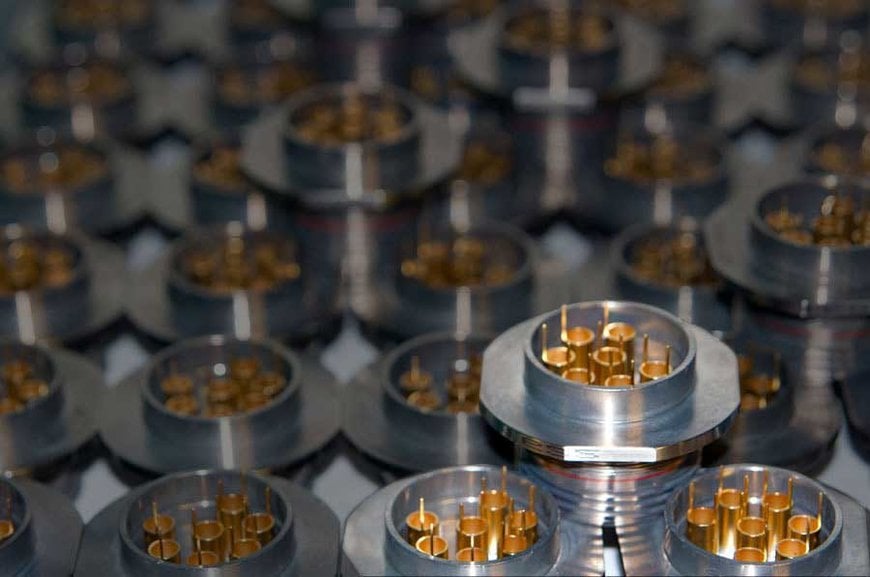The essential role of RF connectors in quantum computing
Here, Alex Raymond, European product manager, at connector specialist PEI-Genesis, explore the importance of RF connectors in quantum computing.
www.peigenesis.com

Quantum computing, the frontier of computational technology, promises to revolutionise various fields, from cryptography to drug discovery. Central to the functioning of quantum computers are radio frequency (RF) connectors. These components play a critical role in ensuring the precise transmission of signals required for quantum operations.
Quantum computers use quantum mechanics to process information differently from classical computers. Unlike classical bits, qubits can represent both 0 and 1 simultaneously through superposition. This, along with entanglement and interference, allows quantum computers to perform complex calculations faster.
Precise control of qubits is essential, which is where RF technology comes in. Quantum computers rely on RF signals to manipulate qubits at very low temperatures, making RF connectors key for maintaining signal integrity and ensuring accurate system performance.
The role of RF connectors
Quantum states are fragile and must be maintained to prevent qubits from losing coherence. Therefore, maintaining the correlation and control of qubits is a fundamental challenge in the development of quantum computing technology. This challenge is exacerbated by RF "noise" from thermal, magnetic and mechanical sources.
High-performance coaxial cable assemblies, including cables and connectors, are crucial for delivering precise microwave signals to qubits, enabling their operations. These assemblies reduce environmental noise and signal degradation, ensuring reliable and accurate quantum computing.
RF connectors must meet several requirements to deliver precise and stable signals for controlling qubits, including, low loss, low noise, stability in extreme environments, high frequence range and immunity to magnetic interference.
Low loss and low noise
In RF connectors, low loss refers to the minimal attenuation of signals as they pass through the connector. Quantum operations require high precision, and any signal degradation can lead to errors in qubit manipulation and measurement. Low loss connectors ensure that signals maintain their strength and integrity from source to destination.
Lower signal loss also reduces the amount of heat generated in the system, which is especially important in cryogenic environments. Excess heat can disturb the delicate thermal balance required to maintain quantum states.
RF connectors achieve low loss through precision engineering and high-quality materials, such as gold-plated contacts and low-dielectric-loss components. Their design ensures tight, stable connections to minimise reflections and resistive losses.
Low noise in RF connectors is equally critical, as quantum systems are highly sensitive to external and internal disturbances. Low noise performance ensures that the signal remains clean and free from interference, which is essential for accurate quantum operations.
Vibration and mechanical disturbances can introduce noise in RF signals, so connectors for quantum computing must be robust and stable to prevent microphonics. Using low-resistance, high thermal conductivity materials reduces noise, while advanced connectors sometimes use superconducting materials to achieve near-zero resistance and minimize thermal noise.
Extreme temperature conditions
Another essential feature for RF connectors in quantum computing is their ability to withstand extremely low temperatures. Quantum computers must be exceptionally cold to be stable, typically with temperatures reaching 0 Kelvin (-273 degrees C).
To adhere to the temperature requirements, RF connectors must be designed with materials like niobium and niobium-titanium or to feature metals and alloys that do not become brittle at cryogenic temperatures, such as certain stainless steels and copper alloys.
Reducing magnetic interference
Quantum computers transmit RF signals within a magnetic field, necessitating non-magnetic connectors in critical areas of the signal path as the presence of any magnetic material in these components may cause interference.
Connectors must shield against magnetic influence, with minimal susceptibility and no field distortion. Manufacturers enhance non-magnetic properties through coatings, such as gold or palladium plating, to reduce magnetic effects.
PEI-Genesis offers a variety of RF connectors, including Cinch's Johnson non-magnetic connectors, made from high-purity copper alloys for optimal performance. Designed with a 50Ω impedance and frequency range of 4GHz to 18GHz, they are ideal for quantum computing. With stock available in Europe, PEI-Genesis can deliver these connectors within 48 hours.
Quantum technology offers unprecedented computing power but comes with high complexity To unlock its full potential, specialised non-magnetic RF interconnect solutions are crucial. As the technology advances, developing high-performance RF connectors will be key to fully realising quantum computing's capabilities.
www.peigenesis.com

